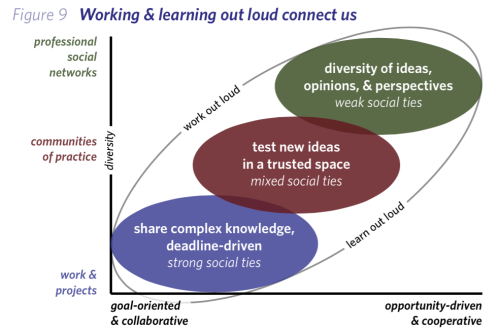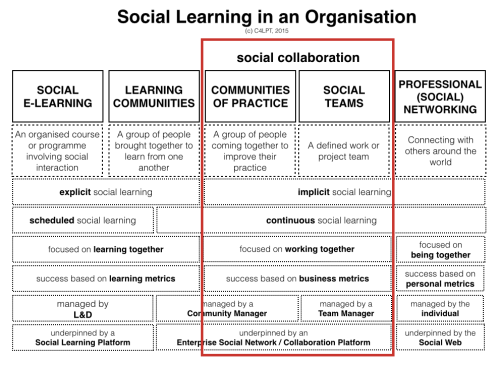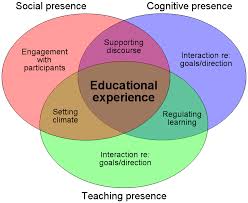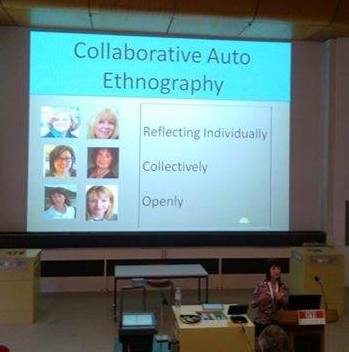I seem to have fallen out of the blogging habit recently. That’s not to say that I’ve not been learning or doing other stuff; I have. It’s just that at the start of the year I relocated back to England and I’ve not been able to get back into the habit. Any way, life might just be starting to settle back down again now so I thought I would try and incorporate a few new practices into my learning. Hey, and with a broadband speed over 10 times greater than I previously had in Ireland there’s gotta be a heap of new opportunities, like just Skyping even. Yay!!
To date, my blog has been a place where I’ve learned to “Learn Out Loud”, much of which has been driven by my participation in MOOCs and similar open learning opportunities. However, if I’m not openly MOOCing, I don’t seem to be in the habit or have the gumption to fire up my blog and document my learning. So, courtesy of Jeff Merrell and the “Work Out Loud” initiative he’s championing within #MSLOC430, I’m going to give it a go. As well as learning out loud, I’m going to try and develop the habit of working out loud.
‘What’s the difference?’, I hear you cry.
Well, I guess it is a bit subtle; that’s probably because the concepts are so closely related, as shown in Harold Jarche’s diagram below. You can read his full article here.

Learning Out Loud is essentially reflection and sense making in public and I guess I’m comfortable with that, well as comfortable as it’s possible to be. Working Out Loud, on the other hand, is the practice of providing a brief, running commentary on your work as you’re doing it.
Bryce Williams, who’s credited with coining the term, defines it as follows:
“Working out loud = Narrating your work + Observable work”
Narrating your work being “journaling…what you are doing in an open way” and making your work observable being “creating/modifying/storing your work in places that others can see it, follow it, and contribute to it IN PROCESS.” Yep, that’s what I’ve not been so good at: journaling what I’ve been doing and allowing others to follow it etc., IN PROCESS. The minute I realized this, it immediately made me think of learning maths at school and how I was lousy at it, or hit and miss at any rate; I didn’t always show my working out. If I did get the right answer there was no way of really knowing how I got there and if I didn’t get the right answer, well …where do you start to put it right? If you don’t work out loud, how can anyone help you or contribute as you go along?
So, having ironed that out, what have I been learning and what am I working on.
Well, I’ve been thinking a bit about learning outcomes. It’s always a topic that wears me out. I remember during initial teacher training expressing the sentiment that ‘nothing ever grew by being measured’; needless to say, it wasn’t well received and I’ve been taxed by the whole question of learning metrics ever since. Any way, it seems like the topic is much in the air at the moment and I’m not alone in pondering the current state of play and the alternatives. Over in #rhizo 15, Dave Cormier asked what is being measured, or counted, and he posited the idea of learning subjectives as opposed to learning objectives. Here, Lisa Lane and Tania Sheko gave 2 brilliant responses. Lisa explains that measuring learning outcomes is “all a ruse”
I can’t measure learning, only the symbolic artifacts of learning.
and, based on the premise of being interviewed to become a lifelong learner with the essential requirement being learning objectives, Tania got all creative and wrote a script to champion a more subjective approach, Mr X loses his battle for objectivity. Here’s the nub of the thing:
You see, I’ve developed an allergy to things which support objectives. Things like preconceived ideas, data entered carefully into spreadsheets, dot points, the narrowness of finite theories, that sort of thing. I have an aversion to these things and I become so ill that I am unable to function.
I need to approach life in a less organised, predetermined way. I need to include the way I feel, for example, in the way I understand life. I need to include questions and doubts in the way I make sense of things, I need mood changes and I also need to be able to synthesize seemingly illogical things into a new way of seeing. I need to follow – what I refer to as learning subjectives.
Both are excellent posts and well worth reading. Duly bookmarked for posterity.
In the meantime, I came across this graphic from Jane Hart that differentiated learning metrics according to the learning context and who was responsible for managing the learning outcome… and so the penny dropped.

And, satisfyingly, the penny dropped once more when I read a post from the LSE Impact blog about systems of measurement and the influence they exert on our behaviour.
As a case in point, it used football and the increasing use of statistics within the game to show that the way we choose to measure affects behaviour. It’s nothing new; it’s just that it’s more pervasive now with the advent of smart technology.
Football is a useful case study in that it allows us to see just how powerful metrics can (be seen to) be. It allows us to think about how metrics might produce different outcomes, dictate decisions and continue to shape our lives.
Gets me thinking of learning analytics.
it is crucial that we see metrics as being central to the power dynamics of the age in which we live.
Oh, I also read a post by Donald Clark entitled ‘7 reasons: Why we need to kill boring learning objectives!’
The reason I’m thinking about all this is because I’m now looking for how I can best apply the knowledge and skills I’ve developed and I’m inclined to think that it lies in supporting and developing social/networked autonomous professional learners – just like me!! However, having said that I don’t want to forget or leave behind the work I currently do with adults that either don’t have access to technology for learning or who have been disadvantaged by what education chooses to measure.
Not just literacy, but digital literacies for all!!
Image sources:

This work is licensed under a Creative Commons Attribution-ShareAlike 4.0 International License.













